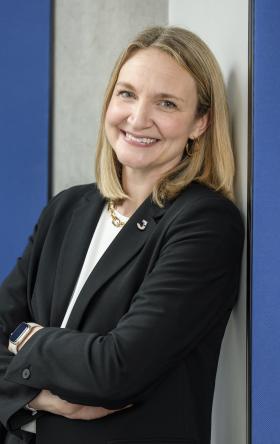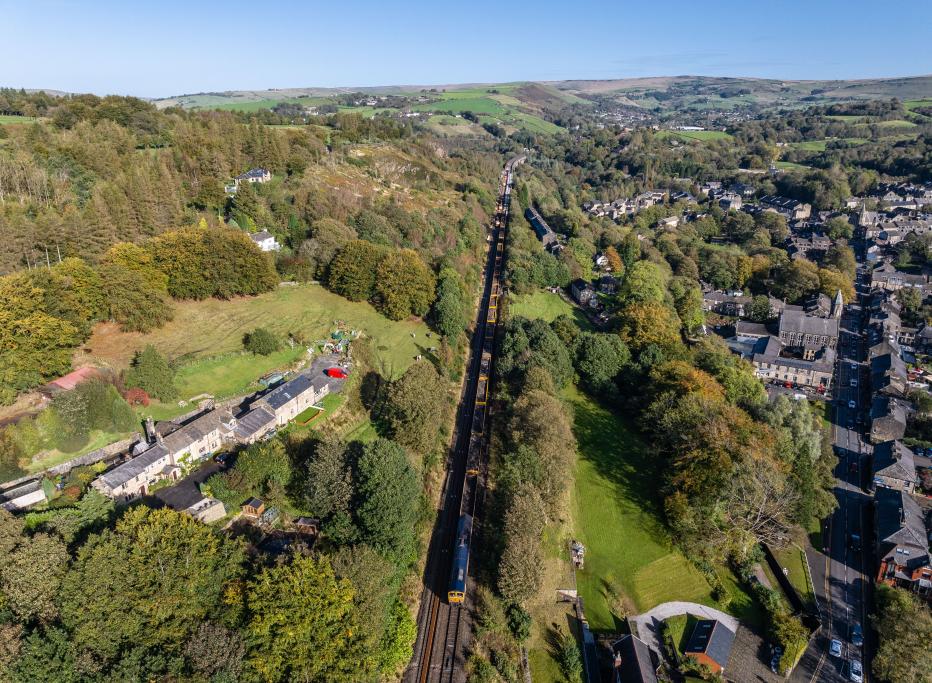
Credit: Transpennine Route Upgrade
The Transpennine Route Upgrade (TRU) is a large-scale railway infrastructure investment program between Manchester to York via Huddersfield and Leeds. It will deliver faster, greener and more reliable journeys across the north of England, and it places people first in a pioneering community-needs approach that uses key social assessments throughout the program lifecycle to shape design and delivery for the greatest impact.
TRU will achieve far more than improving railway assets — it will enhance lives in a legacy of moving more essential goods by rail, attracting more people to use the train, helping communities prosper, creating jobs for local people and applying decarbonization principles.
TRU is being delivered by more than nine organizations — including Jacobs — and is united in a common mission to deliver the greatest value to communities along the route. Between April 2019 and March 2024, the TRU social impact program had already generated $1.86 billion (£1.47B) in social value by delivering 264 apprenticeships, engaging more than 42,460 young people in STEAM (Science Technology, Engineering, Arts, Mathematics) delivery of 16,300+ days of work experience, contributing 11,000+ hours of volunteering, and $532 million (£420M) spent with local businesses and $277M (£219M) with Small Medium Enterprises (SMEs).
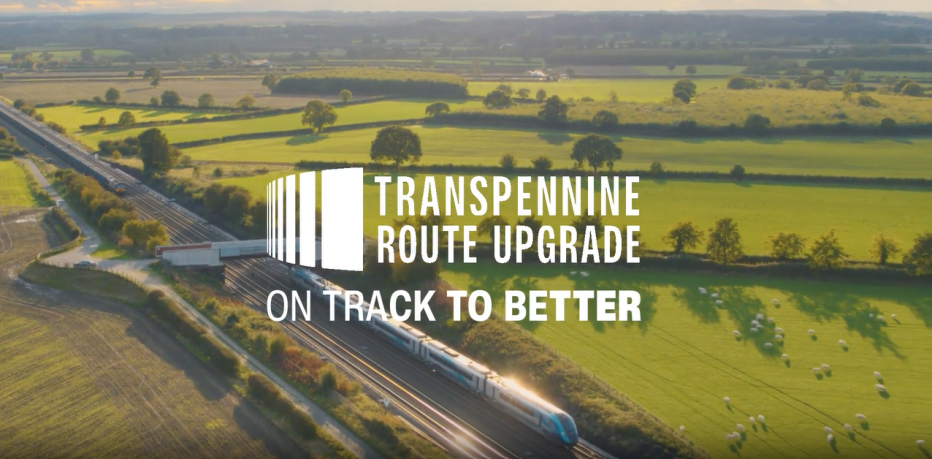
-
$ 1.86 B
in social value generated
-
42 K+
young people engaged in STEAM
-
16300 +
days of work experience
-
$ 532 M+
spent with local businesses
-
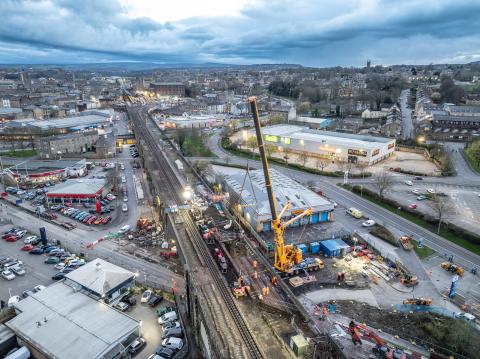
Credit: Transpennine Route Upgrade
-
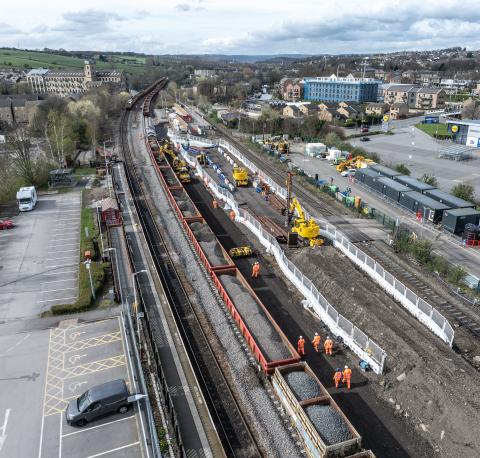
Credit: Transpennine Route Upgrade
-
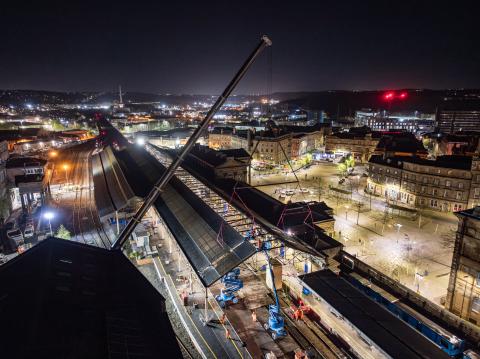
Credit: Transpennine Route Upgrade
Unlocking local success through needs-led asset delivering
Social value is the total net benefit of a project or investment on society – delivering meaningful improvements to peoples’ long-term quality of life through positive impacts and transformative outcomes – socially, environmentally and economically. Some of the effective tactics used in the industry-leading TRU Social Value Program include:
- Social value modeling
Criteria are developed to assess the impact of design options on the community (both positive and negative), and these are used to inform option appraisals and design. - Community impact assessments
These consider potential impacts of works based on community demographics and stakeholder views to help inform design and construction. For example, at Leeds Station, an acoustic curtain was used during night-time surveys to provide up to 32dB in noise reduction. - Diversity impact assessments
By engaging with community stakeholders to understand their needs and the potential impact of interventions during a project, the collected information informs designs. - Local needs analyses
Local needs analysis for sections across the route built a summary of community key challenges. This was used to develop the TRU Social Value targets and help address areas of high social, economic and educational deprivation. To deliver these, the TRU teams engaged with local stakeholders to develop local delivery plans and build requirements into contracts of our delivery partners. This complemented other work delivered through socio-economic impact assessments, social and economic benefit reports within business cases and community impact assessments. - Collaboration for social value across major projects
Alongside East West Rail, we also led the creation and development of the Social Value Major Projects Forum, bringing together major projects across the U.K. in rail and beyond to drive the social value agenda, contributing to a new government white paper on the future of social value.
Improving quality of life through the TRU Social Value Program
The program is delivered by all parties involved in TRU, embedded in contractual requirements and driven through an inclusive, community-centric culture. It forms part of TRU’s ‘Our Guiding Compass’, the sustainable development strategy up to 2035.
The most significant community benefit is direct employment with TRU as a catalyst for social mobility, and it’s guided by the program rules of offering 60% of employment to employees living within 25 miles of the program and 80% of employment within 40 miles. TRU plans to support over 8,000 roles, creating 4,000 new opportunities and safeguarding 4,000 roles during construction.
Supporting diversity and inclusivity, 20% of all new jobs, apprenticeships, work experience and STEAM engagement are directed towards under-represented groups, specifically focusing on areas of high deprivation.
Examples of program activity and impact include:
Community regeneration and enhancement
Working with Strawberry Fields Primary School (Leeds) and Garforth Community Greening Group, the TRU team regenerated the school’s heavily vandalized nature area. Through carefully co-designing the space, the health, safety and accessibility of the area were improved, and an outdoor classroom with a sensory garden was created. TRU contributed 383 hours of volunteering, engaged 194 students and created an inclusive space for future students to enjoy.
In another example, the TRU team collaborated with Micklefield Parish Council, Micklefield CoE Primary School and Leeds Wood Recycling Community Interest Company to transform a disused bowling green into the Micklefield Community Wildflower Meadow. By working with the community, the TRU team ensured this project delivered multiple benefits, including enhancing the environment and habitats, supporting education through STEAM delivery, and improving the quality of life of local people who were able to access the green space for recreation, encouraging an improved sense of place in a deprived area.
Inclusive education program
The TRU team developed and delivered an education program that has reached more than 42,460 young people and inspired a pipeline of diverse talent into the industry. It’s supported by new, inspiring curriculum-aligned resources developed with partners such as STEAM Learning, Northern and TransPennine Express, and innovative careers events such as Realizing Rail. The TRU team designed this annual event in partnership with the National Collaborative Outreach Program (Aim Higher) to engage further education students from disadvantaged backgrounds. To date, the TRU team has engaged nearly 800 individuals and helped students better understand their career options.
In addition to delivering over 16,300+ days of work experience, the TRU team created an innovative Workplace Safari Program for neurodiverse students to gain insights into workplaces. Workplace Safaris were trialed with United Response, a charity that works with neurodiverse young adults struggling to access employment opportunities. It was placed on the Social Mobility Awards 2020 Honors Roll for the advancement of social mobility.
Addressing inequality
Central to the TRU Social Value Program is supporting those most in need through improved access to skills, education and employment. TRU has delivered over 230 hours of mentoring economically inactive adults and 770 days of work experience for marginalized adults.
The TRU team engaged 56 military veterans through Project Recce, a social enterprise created to support ex-military into new careers within the construction industry. Individuals who took part said they were inspired to pursue rail-related careers, and two ex-military personnel progressed to become mentees under TRU’s successful mentoring program.
Igniting change in recruitment
Within the Manchester area, young people are particularly at risk of homelessness and unemployment when they are part of the care system. The TRU team has partnered with Radical Recruitment, an innovative organization working with young people disenfranchised from the job market, leaving care, experiencing mental health issues and those at risk of homelessness. The partnership helps prepare marginalized young people for job interviews, helping to improve essential employability skills such as CV writing and interview techniques and offering mentoring programs.
Within the Leeds area, the TRU team works with the Spear Program, which offers long-term support for young people facing barriers to work or education around the Leeds area. TRU has worked with Spear over the last few years, supporting the charity’s ambition to help young people realize their potential through employability skills workshops, career talks including real-life examples of struggles and successes, as well as financially supporting the Spear Program through TRU’s supply chain to enable more individuals to participate in the program.
Creating better ways to measure community impact
TRU is trailblazing social impact measurement as an early adopter of the Rail Social Value Tool (RSVT). The RSVT is an innovative approach to monitoring, measuring and calculating the social value of activities which, alongside stakeholder feedback, informs our future approach and helps to assess the impact the programs have on the local quality of life. Alongside the RSVT, TRU also uses BREEAM (Building Research Establishment Environmental Assessment Method), a globally leading, science-based suite of certification systems to drive sustainability in design and asset performance.
Additionally, major programs like TRU have hugely profound impacts on people’s wellbeing - commutes impact our disposable income, our free time with family and friends, our levels of stress and so much more. To measure this, TRU has also undertaken a new, cutting-edge economic assessment called a ‘WELLBY Assessment’ in order to understand what we are delivering is improving the lives of our communities. This WELLBY Assessment was made to estimate the potential value of the wellbeing improvements in delivering TRU in addition to TRU’s wider economic impact assessments. In addition to initial economic analysis, we calculate that TRU can contribute towards an estimated $6.2B (£4.9B) in wellbeing impacts across the North of England.
New ways to drive impact and communicate to our stakeholders
TRU has the objective to focus future social value activities on outcome to communities in most need, moving away from output driven targets. This approach will maximize the benefit of social value interventions on our program by delivering for demographics and areas most in need. To support this approach, Jacobs developed and implemented an innovative GIS software, Project Mapper, to drive both reporting and social value planning. The tool allows TRU to map out activities across our core geography and beyond, and extract more accurate information to inform our key stakeholders in local government. The maps are then layered with indices of multiple deprivation to help us target areas where interventions can be most beneficial.
Leeds Station Capacity Achieves BREEAM Infrastructure “Excellent”
TRU is using BREEAM Infrastructure (Version 6), formerly CEEQUAL, to create an amalgamated program score and rating, and the Leeds Station Capacity is the first TRU project to achieve the BREEAM Infrastructure Excellent rating. BREEAM Infrastructure recognized the sustainability of the project including the construction of platform 0, the station’s first new platform in nearly 20 years. Jacobs was appointed by Network Rail to manage the BREEAM Infrastructure assessment. This involved developing a target strategy, supporting sustainability specialists, helping the project to embed BREEAM Infrastructure into design and construction activities and completing the formal assessment.
“The TRU program will make a difference to the lives of millions of people living and working in the North. This isn’t just about delivering faster, more frequent and more reliable journeys for passengers or moving more goods by rail. It’s about leaving a lasting legacy in the North by investing in local people and communities and slashing our carbon footprint above and beyond the standard.”
Some of the team involved
-

Jamie McKinnon, TRU Social Value Manager and Jacobs Associate Director of Sustainability
Jamie has overseen the redevelopment of program social value requirements to challenge performance and quality of social value delivery, while also supporting the wider strategic review.
-

Becky Richardson, TRU Social Value Manager and Jacobs Senior Social Value Consultant
Becky is our social value technical expert, supporting governance and social value program development with delivery partners across the program.
-

Grace McCormack, TRU Sustainability Certification Manager and Jacobs Sustainability Consultant
Grace oversees the certification process for TRU’s BREEAM approach; implementing essential governance and assurance procedures to drive performance towards the certification and all sustainability disciplines.
Award-winning success
Women in Rail Social Value Award 2023 Highly Commended
Women in Rail Social Value Award 2021 Highly Commended
Spotlight Rail Corporate Social Responsibility Award 2024 Highly Commended























